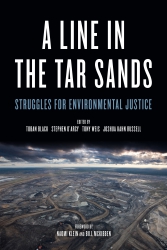
Drawing a line in the tar sands
A Line in the Tar Sands: Struggles for Environmental Justice
D'Archy, Stephen; Black, Toban; Weis, Tony; Russel, Joshua Kahn
http://climateandcapitalism.com/2014/10/02/drawing-line-tar-sands/
Date Written: 2014-10-02
Publisher: cliamteandcapitalism.com
Year Published: 2014
Resource Type: Article
Cx Number: CX16937
The fight over the tar sands is among the epic environmental and social justice battles of our time. The very active tar sands struggle is no less than a life-and-death battle for the future of the planet. It is a battle that pits these peoples' movement against the largest and most destructive industrial project -- a project driven by the big the most profitable and powerful transnational energy corporations.
Abstract:
Excerpt:
As our governments willingly unleash unprecedented destruction upon the earth through the promotion of extractive industries, and growing mobilizations of climate activists challenge climate emergency, I am reminded of a cautionary warning: "the Owl of Minerva takes flight at dusk."
---
As if responding to this desperate need to hurry the inauguration of a new historical era, Stephen D'Arcy, Toban Black, Tony Weis and Joshua Kahn Russell, editors of A Line in the Tar Sands, bring together the voices of activists and academics to argue "peoples' movements will either succeed in transforming our economic and political systems to build a new world, or we will burn with the old one."
---
This argument, cemented by Naomi Klein and Bill McKibben stating "the fight over the tar sands is among the epic environmental and social justice battles of our time" in the opening pages, suggests the very active tar sands struggle is no less than a life-and-death battle for the future of the planet.
---
Fossil fuel corporations are digging up carbon that was produced by billions of years of decomposition of organic matter and remained underground through natural processes, permitting life to flourish on the planet’s surface.
---
In a few short years, this capitalist enterprise has caused a dramatic overburdening, creating massive levels of carbon pollution as waste and a dangerous imbalance increasingly undermining those very life support systems.
---
The tar sands agenda, argues Martin Lukacs, empowers the political machinations of the reactionary Right in Canada. It reinforces a corporate constitutionalism that locks-in trade and investment through bilateral and multilateral agreements that secure investment "certainty" through the engineered collapse of environmental regulatory frameworks.
---
However, James Hansen, says that “continuing exploitation of the tar sands would amount to ‘game over’ for the climate, as it promise[s] to ensure a range of very dangerous feedback loops [that] would kick in — the so-called ‘runaway’ climate change scenario.”
---
First, the anti-tar sands movement is increasingly influenced by the inclusion of those who are most affected: the frontline communities marginalized by race and/or class. The movement as a whole is thus becoming less middle class, white, male and privileged.
---
Second, the environmental and social justice concerns of the anti-tar sands movement are coalescing by drawing connections between neoliberal anti-environmentalism and much broader assaults on democratic processes and institutions. This leads to the deepening of critical stances against business-as-usual approaches of mainstream environmental non-governmental organizations (ENGOs), and harsh denunciations of reactionary environmentalism and false, market-based solutions, argues Ryan Katz-Rosene.
---
The climate justice movement will continue to radicalize and abruptly challenge the priorities of capital. It will confront the traditional environmental movement as well as Left politics as it forges a new constellation of political forces concerned with Indigenous rights and title, migrant rights, labour rights and the rights of nature.
Subject Headings


